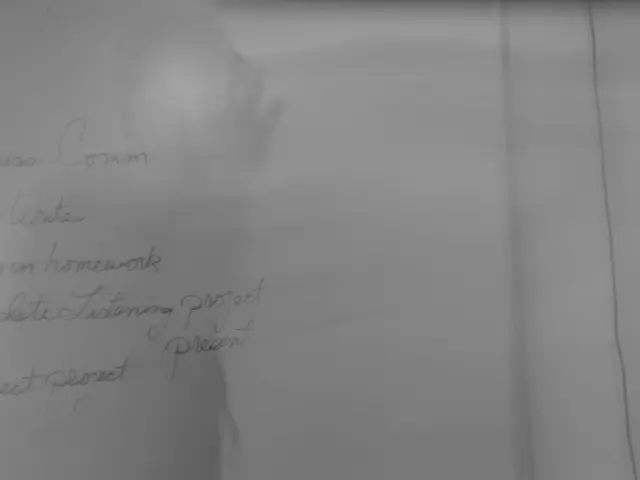Diving into Karsten Wildberger: The Man Prepped to Digitalize Germany
Germany's High-Ranking Executive, Karsten Wildberger, Now Focuses on Digitalization Efforts - High-ranking Executive must eventually transform Germany into a Digital Powerhouse
From a politically pulsating Berlin, a fresh face emerges - Karsten Wildberger. Born in 1969, Wildberger, a physicist by degrees, is swiftly making waves. As the prospective Minister for Digitalization and State Modernization under Chancellor-elect Friedrich Merz, he's more than just a buzz in town.
With a track record as a successful tactician, Wildberger has spearheaded the Media-Markt-Saturn group since 2021, breathing new life into the electronics retailer amidst Amazon and Temu encroachments. Now, he's all set to steer Germany's digital transformation.
Before the political limelight, Wildberger amassed a wealth of experiences. He dabbled in consultancy, held managerial positions at renowned telecommunications providers, and globe-trotted for Boston Consulting. This global odyssey eventually led him to politically vibrant Berlin. Interestingly, Wildberger, largely an unknown entity in the political sphere, has evaded recent whispers among political insiders.
Karsten Wildberger and Friedrich Merz: A CDU Tie That Binds
Wildberger, for eight years, has graced the Economic Council of the Conservative CDU. Fun fact: Merz held the vice-presidency until 2021, even after his exit from federal politics. With Merz's departure, who might have guessed, Wildberger stepped into his shoes. Merz seemingly relies on a trusted aide for the digital crusade.
However, transitioning success from the corporate world to the political arena is a complex journey. This role is more than a career marker for Wildberger; it's a monumental challenge!
Unraveling the Gordian Knot of Administrative Digitization
The task, though daunting, is immense. Wildberger, the savior of Media-Markt-Saturn, faces the challenge of untangling Germany's bureaucratic digital knot. The country has seen ministerial teeth-gritting since Thomas de Maizière, as previously, little progress has been made in digitalization despite billions of euros in investments.
The hurdles are steep. For years, German federal, state, and regional administrations couldn't agree on the basics of digital infrastructure. The federal government shoulders much administrative responsibility, but this truth rarely surfaces in public communication. As a result, Germany's digital progress has been sluggish.
To accelerate this change, the coalition agreement outlines a clearer role for the federal government. For effective change, however, the formidable state leaders must cede some authority. But even with concessions, governing comes with its technological peril. Unlike corporations, state entities can't outsource projects to technology providers. Instead, new ministries, like the one Wildberger will lead, must adhere to intricate administrative regulations.
Digital Policy in the Age of Geopolitics
The game of digital governance has transcended national boundaries, becoming a form of hardcore geopolitics. If Donald Trump desires, he can restrict access to essential digital resources for his allies. His Vice President, J.D. Vance, doesn't shy away from asserting America's aggressive stance in digital policy. European nations, in contrast, are still figuring out their position - questioning how to minimize dependency on the USA and China without compromising their interests.
The specifics of Wildberger's role remain uncertain, as the responsibilities within the future federal government haven't been finalized. That he, a political novice, is diving deep into this double-edged mission: ambitious. To avoid drowning, Merz has assigned two veteran Members of Parliament, Philipp Amthor and Thomas Jarzombek, to support Wildberger in administrative modernization and digital policy. These seasoned political veterans will lend their political acumen to help Wildberger navigate this challenging terrain.
As Wildberger steps onto this uncharted political turf, it's clear that the going gets tough. Let the games begin!
- As the prospective Minister for Digitalization and State Modernization in Germany, Karsten Wildberger, a CDU council member, is expected to digitalize the country, following in the footsteps of Chancellor-elect Friedrich Merz.
- Wildberger, formerly of the Media-Markt-Saturn group, faces a complex journey as he transitions from the corporate world to politics, with his role being more than just a career milestone.
- The challenge for Wildberger is to untangle Germany's complex bureaucratic digital knot, a task that proves daunting given the lack of progress in digitization despite significant investments.
- In the age of geopolitics, digital governance has become a form of hardcore politics, as shown by the US's aggressive stance in digital policy, with European nations still struggling to define their positions.
- To navigate this challenging terrain, Merz has assigned two veteran Members of Parliament, Philipp Amthor and Thomas Jarzombek, to support Wildberger in administrative modernization and digital policy, leveraging their political acumen to help him avoid potential pitfalls.










